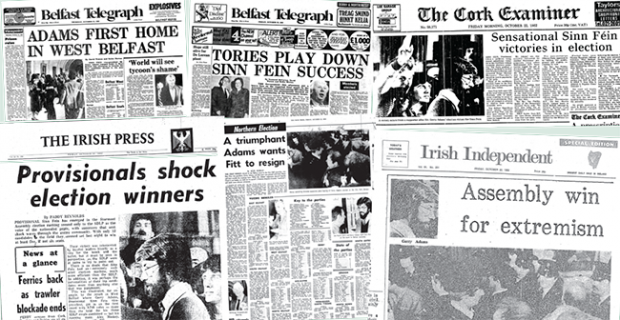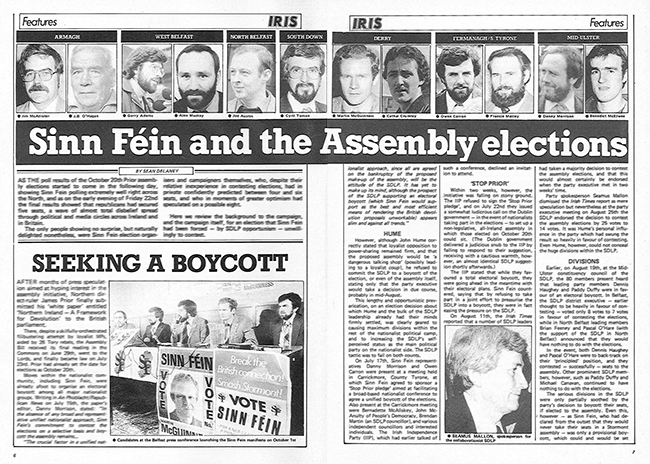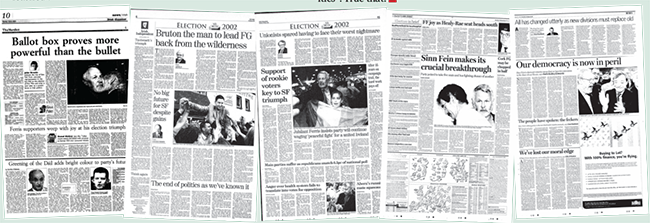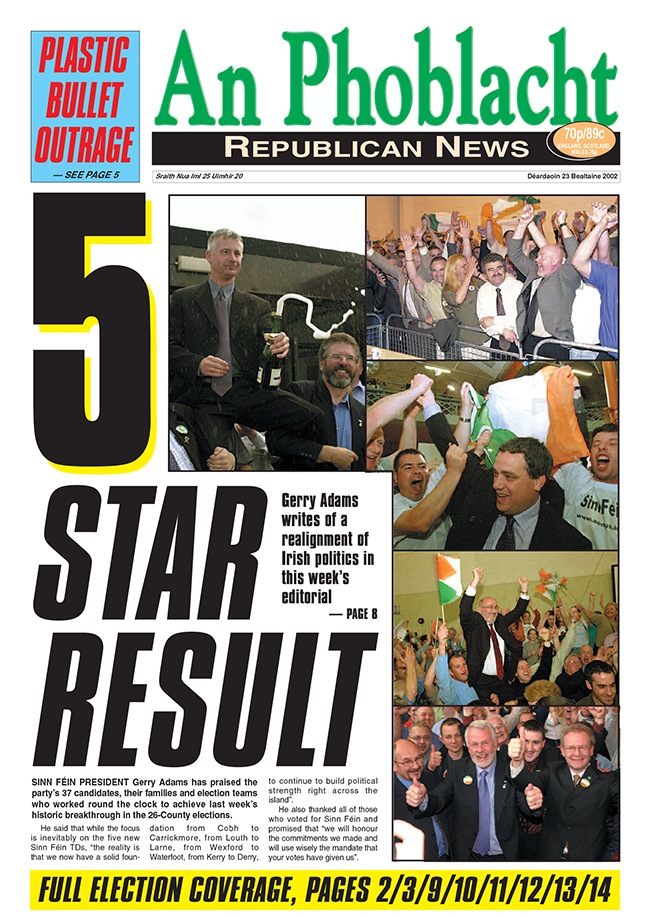4 August 2022 Edition
A victory for the Republican struggle
Remembering the 1982 Assembly and 2002 Dáil elections

2022 is benchmarking two critical events in Sinn Féin’s electoral history. This October marks the 40th anniversary of the Prior Assembly elections where Sinn Fein won five seats and 10.1% of the poll. 17 May was the 20th anniversary of the party’s major leap in representation in Leinster House. The party won five seats in the 26 County general election.
In the immediate aftermath of the 1981 Hunger Strikes, the Sinn Féin Ard Fheis of October 1981 voted to run candidates in future elections. The 1982 Assembly elections promoted by then Northern Secretary James Prior was the first Six-County election contested by Sinn Féin. It also marked the first electoral victories of Martin McGuinness and Gerry Adams.
Sinn Féin topped the poll in two of the 12 constituencies. They were West Belfast and Fermanagh South Tyrone. The party contested seven of the 12 constituencies. There were 78 seats in the assembly.
The Sinn Féin candidates were Jim McAllister and JB O’Hagan in Armagh. McAllister won a seat. Joe Austin ran in North Belfast, Gerry Adams and Alex Maskey in West Belfast, Cyril Toman in South Down, Owen Carron and Francie Molloy in Fermanagh South Tyrone. Carron topped the poll here, winning a seat. Cathal Crumley and Martin McGuinness ran in Derry. Danny Morrison ran in Mid Ulster, being elected on the sixth count.
The following year, Gerry Adams was elected MP for West Belfast, with Danny Morrison narrowly missing out on a second seat in Mid Ulster. Alex Maskey, an unsuccessful candidate in the 1982 election, won a Belfast City Council by-election the following June, becoming the first Sinn Féin representative on the council since the early 1920s. He was followed onto Belfast City Council in later elections by Joe Austin who narrowly missed out on winning a sixth Sinn Féin seat in 1982.

There was extensive media coverage of the election. A front-page headline in the Belfast Telegraph proclaimed, “Adams first home”. He was the first candidate elected to the Assembly. “Sensational Sinn Féin victories in election” was the Cork, now Irish Examiner’s front-page headline. The article reported how “The party grabbed a political foothold in its first ever Northern Ireland election and answered Prime Minister Margaret Thatcher’s taunts to test its popularity at the polls”.
Adams was reported in the Belfast Telegraph as saying, “The media can interpret this result any way they wish. I do not regard it as a personal victory. It is a victory for the Republican struggle”.
“Assembly win for extremism” was the Irish Independent front-page headline, while also acknowledging that Sinn Féin had “won a political foothold”. “Provisionals shock election winners” was the Irish Press front page headline. Sinn Féin’s success had “sent shock waves through the entire community”. It was also the first appearance of media clichés about the party’s “well-oiled election machine”.
“Sinn Féin takes 10% of NI vote” was the Irish Times front-page headline. Ed Moloney declared in the article that the Sinn Féin support “was mainly due to the mobilization of a hitherto untapped vote”.
What we didn’t know in 1982 was that the Sinn Féin electoral success would fuel a new industry in media pundits speculating as to why voters chose the party. The Irish Times and many other news outlets began to speculate in a tradition that continues to the present day.
In 1982, the Irish Times editorial wondered, “What is Sinn Féin going to do with its success? How will it lead those who gave so liberally of their votes?”

By 2002, the Sinn Féin media watchers had become a full-time obsession for some. In May, Sinn Féin won 6.5% of the first preferences, and five Dáil seats, narrowly missing out on a sixth in Dublin Central. The five Sinn Féin TDs were Caoimhghín Ó Caoláin, who topped the poll and held the Cavan Monaghan seat he first won in 1997. Aengus Ó Snodaigh and Seán Crowe took seats in Dublin, Martin Ferris in Kerry North, and Arthur Morgan in Louth.
John Breslin reporting in the Irish Examiner from the Dublin South West count, where Seán Crowe topped the poll, wrote that “Seán Crowe told his supporters that he was going to fight for beds, buses, and to the loudest cheer, a United Ireland”.
Breslin was trying to decipher how, “Sinn Féin managed to engineer its stunning political breakthrough, grab five seats, and build the foundation to make them a major player in years to come”. He too like many other reporters had discovered “a well-oiled and committed political machine” that he describes has having been ‘unleashed’!

Senan Molony writing in the Sunday Independent reported how an RTÉ Lansdowne research opinion poll had found that ‘Sinn Féin had received more first voter support than all of the main parties’ and this was “a fact that should scare the living daylights out of all the other parties on the left of Irish politics”.
“No big future for SF despite gains”, was the headline in an Irish Independent article penned by Conor Cruise O’Brien, disagreeing with the Sunday Independent’s Ronan Fanning who the previous day had declared, “Sinn Féin not Labour is now poised to become the real opposition over the coming decades”. “It seems to me that Sinn Féin has reached its peak in this election” wrote Cruise O’Brien.
The Irish Times editorial after the 17 May poll proclaimed that, “There will be mixed feelings about the performance of Sinn Féin. The metropolitan perspective’s on Mr Martin Ferris’s success in North Kerry is one of shock and horror”.
Last words to a much younger Robbie Smyth quoted by Mark Hennessy in the Irish Times: “This has marked a shift in Irish politics”. True that!




